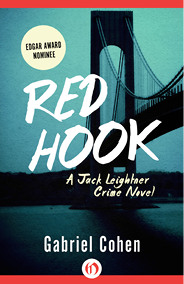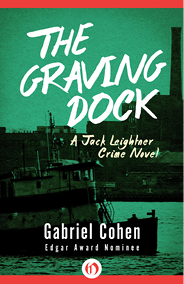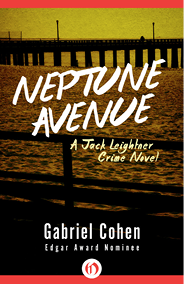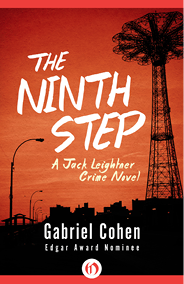Neptune Avenue (30 page)
THEY HAD TO WAIT
for the Crime Scene Unit to show up, take fingerprints, and check for other evidence. Jack found himself thinking about yesterday’s visitor again. “I’m gonna step outside for a little fresh air,” he told Powker. He stopped by the front door to pour himself a cup of watery coffee, then paid for it at the cash register, along with some money for his partner’s snack. He glanced down: the perp’s shopping basket was still there on the floor. A liter bottle of Coke. Three oranges. A stick of butter. A couple of eggplants. Some ice cream. Hopefully the items would have picked up some good fingerprints.
Outside, the sidewalk had been blocked off with a reel of yellow crime scene tape. A couple of radio cars were parked at the curb, and their uniforms leaned against the hoods and shot the bull, awaiting instruction from the detectives. Their walkie-talkies squawked intermittently; the brakes on a city bus squealed as it pulled in toward the curb a few yards away.
Jack took a deep breath of the spring air and looked back at the store. Several tiers of cheap floral bouquets graced the front of the little bodega. A sign ran above:
BEER, SODA, CANDY, COFFEE, LOTTO, CIGARETTES.
Reflexively, the detective sought out the pattern. When you thought about it, he mused, the place was a regular pit stop for minor vices, for people seeking some reliable little hit of pleasure during their daily grind. And who could blame them?
He glanced down at his watch. The Crime Scene Unit could be delayed for a while, if their teams were busy with other cases. Sometimes the job seemed to be all about waiting.
A big truck came lumbering along Coney Island Avenue, which was a drab commercial stretch of car washes, auto parts emporia, international phone card stores, and humble Middle Eastern food joints that fed the many brown-skinned local taxi and car service drivers. Their wives strolled by, wearing bright saris or somber head scarves, surrounded by lively children. The area was home to Pakistanis, Bangladeshis, and other Muslim immigrants.
Jack stared off down the sunny thoroughfare, but in his mind’s eye he was seeing a little street in Red Hook, watching a police car come along several blocks down, waiting for it to arrive. But it never would, no matter how many years he waited. No matter how many times he replayed the scene, his brother would always drop to the sidewalk, holding his mortally wounded side. One little moment in time, one split second when the whole world turned upside down. Jack had spent a lifetime obsessing about that random encounter, wishing he could go back and fix it, wishing he could pull the harsh words back into his mouth.
Only, the thing was, based on what the stranger had told him, it hadn’t been random at all. Maybe he had been carrying this burden of guilt for nothing.
He sighed and turned; like it or not, he needed to go back inside and wrap up this silly bodega killing. Maybe the perp was nuts; maybe he had had some prior run-in with the vic. Perhaps the guy had been screwing his wife. Either way, it looked to be just another rinky-dink slaying, like a thousand others.
Routine—until the van came screeching up and the men in the protective bodysuits jumped out.
T
HERE WERE FOUR OF
them, and they looked like deep-sea divers as they piled out of the vehicle, which was not at all like a typical NYPD undercover van (dented and unwashed). No, this was a shiny black ride that might as well have had signs painted on it:
PROPERTY OF THE FEDERAL GOVERNMENT
. The men—they all
looked
like men, though it was hard to tell, considering their bulky, hooded suits—wore oxygen masks. Jack’s first thought was
biohazard
, but then he saw the yellow-and-black radiation symbols, which always reminded him of the fallout shelter sign in his elementary school cafeteria. The last man out carried a clicking device.
The NYPD uniforms guarding the perimeter tried to question this odd crew, but they ducked right under the tape.
Jack held up a hand. “Whoa! What the hell’s going on?”
The man in front tugged at his mask; the rubber squeaked as he lifted it over his hooded head. An older guy with a bland, round face, wire-rimmed spectacles, rather stringy white hair combed over his balding pate. Grandfatherly. “You in charge here?”
Jack nodded. “NYPD, Brooklyn South Homicide. Now, who are
you
?”
The man pulled out an unfamiliar I.D. “Brent Charlson. Homeland Security.”
Jack threw a skeptical glance back at the little deli. “You sure you got the right address?”
The man didn’t bat an eye. “How long have you been inside there?”
Jack was definitely starting to get the creeps. “What’s going on?”
“I’m going to have to ask you to clear out any personnel from inside. Immediately.”
A street person, a big man wearing a wool watch cap, soiled sweatpants, and scrunched-up leather slippers, came shuffling around the corner. He stopped short when he saw the crime scene tape and the frogmen. “Yo! What’s happ’nin’? Is this some of that
anthraps
?”
A uniform waved him away.
Jack watched the guy look back anxiously as he shuffled off. Any New Yorker who had lived through 9/11 and the subsequent anthrax mailings took the potential for terrorist activity very seriously. Even four years later, it didn’t take much to get you worrying: any siren, a sudden halt on a subway train, an unattended knapsack.
He turned back to the Homeland Security agent. “So why are you guys here?”
The man gestured for his colleagues to move toward the door. “Call your supervisor,” he said over his shoulder. And in they went.
Jack didn’t like feds. Their Big Swinging Dick attitudes didn’t impress him one bit. They were definitely not team players. He remembered a double homicide in Bensonhurst, a Mob case, where a bunch of FBI agents had actually started hauling away the bodies before the NYPD had even gotten on the scene. And 9/11 had made it starkly clear how uncooperative the different governmental agencies could be, with the Feebs and the CIA withholding vital intelligence from each other. Things had supposedly gotten better since then, each agency pledging to pull together, but everybody still liked a good pissing match. And the three-letter guys—FBI, CIA, NSA, DHS—were the cockiest of all.
Jack pulled out his cell and called Lieutenant Frank Cardulli, the head of his unit. “Hey boss, I’ve got a weird situation here at—”
Cardulli cut him off. “I know. I got a call just a minute ago from downtown. They say we have to let these guys do their thing.”
“What’s going on?”
“I don’t know.”
A second later the door of the deli swung open; out came the owner and his clerk, followed by Richie Powker and the M.E.’s crew. Looking anxious, they moved out past the crime scene tape and a good few yards down the block.
Ten minutes later, the boys in the bodysuits came back out. Their leader followed. “All clear.”
“Was there a problem?” Jack asked. He couldn’t imagine why there would be any radiation inside a deli, but he knew that he didn’t want any on
him
.
“We didn’t get a reading,” Charlson said. “Not this time.” He moved off toward the van.
“Whoa,” Jack repeated. “You wanna tell us what this is all about?”
The man shrugged. “I can understand that you guys don’t like anybody stepping on your toes, and I apologize for the inconvenience.” He took out a card and handed it over. “If you find out anything about the perpetrator, I’m going to need for you to call me right away. And if you get a bead on him, I’m gonna really emphasize this:
don’t try to bring him in yourselves.
There’s a definite radiation risk. Call me and we’ll take care of him.”
Richie Powker made a face. “What’s all this about radiation? The guy killed the vic with a can of beans.”
The Homeland Security agent shrugged. “I know this must seem confusing, and I’m sorry, but I’m simply not at liberty to talk about this. Thanks for letting us do our job here; we appreciate your cooperation.” He turned, strode away, and joined his colleagues in the van.
Off they went.
“‘
Simply not at liberty,
’” Richie mimicked, sourly. “I hate feds.”
Jack went back into the deli. The first thing he noticed was that the can of beans was missing. It took him another minute to discover that the videotape was also gone.
Gabriel Cohen’s debut novel,
Red Hook
, was nominated for the Edgar Award for Best First Novel. He wrote three more mystery novels featuring Brooklyn South Homicide Task Force detective Jack Leightner:
The Graving Dock
,
Neptune Avenue
, and
The Ninth Step
. He is also the author of
Boombox
, a novel, and
Storms Can’t Hurt the Sky: A Buddhist Path Through Divorce
. He teaches in the writing program at Pratt Institute and loves living in Brooklyn, whose spirited, incredibly diverse neighborhoods provide him with a limitless source of vivid material. His website is
www.gabrielcohenbooks.com
.
All rights reserved, including without limitation the right to reproduce this ebook or any portion thereof in any form or by any means, whether electronic or mechanical, now known or hereinafter invented, without the express written permission of the publisher.
This is a work of fiction. Names, characters, places, events, and incidents either are the product of the author’s imagination or are used fictitiously. Any resemblance to actual persons, living or dead, businesses, companies, events, or locales is entirely coincidental.
Copyright © 2009 by Gabriel Cohen
Cover design by Mauricio Diaz
978-1-4804-6717-0
This edition published in 2014 by Open Road Integrated Media, Inc.
345 Hudson Street
New York, NY 10014





